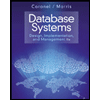
Modern Database Management
13th Edition
ISBN: 9780134792293
Author: Hoffer
Publisher: PEARSON
expand_more
expand_more
format_list_bulleted
Concept explainers
Question
Chapter 4, Problem 4.43PAE
Program Plan Intro
a. Functional dependencies in the Shipment relation
Program Plan Intro
b. Identify normal form of Shipment relation.
Program Plan Intro
c. Convert Shipment relation to Third Normal Form
Expert Solution & Answer
Want to see the full answer?
Check out a sample textbook solution
Students have asked these similar questions
We are considering the RSA encryption scheme. The involved numbers are small, so the communication is insecure. Alice's public key (n,public_key) is (247,7).
A code breaker manages to factories 247 = 13 x 19
Determine Alice's secret key.
To solve the problem, you need not use the extended Euclid algorithm, but you may assume that her private key is one of the following numbers 31,35,55,59,77,89.
Consider the following Turing Machine (TM). Does the TM halt if it begins on the empty tape? If it halts, after how many steps? Does the TM halt if it begins on a tape that contains a single letter A followed by blanks? Justify your answer.
Pllleasassseee ssiiirrrr soolveee thissssss questionnnnnnn
Chapter 4 Solutions
Modern Database Management
Ch. 4 - Define each of the following terms: determinant...Ch. 4 - Prob. 4.2RQCh. 4 - Prob. 4.3RQCh. 4 - Describe the primary differences between the...Ch. 4 - Summarize six important properties of relations.Ch. 4 - Describe two properties that each candidate key...Ch. 4 - Describe the three types of anomalies that can...Ch. 4 - Demonstrate each of the anomaly types with an...Ch. 4 - Fill in the blanks in each of the following...Ch. 4 - What is a well-structured relation? Why are...
Ch. 4 - Prob. 4.11RQCh. 4 - Describe how the following components of an E-R...Ch. 4 - Prob. 4.13RQCh. 4 - Prob. 4.14RQCh. 4 - Briefly describe four typical problems that often...Ch. 4 - Prob. 4.16RQCh. 4 - Explain how each of the following types of...Ch. 4 - Prob. 4.18RQCh. 4 - Prob. 4.19RQCh. 4 - Prob. 4.20RQCh. 4 - Prob. 4.21RQCh. 4 - What is the relationship between the primary key...Ch. 4 - Prob. 4.23RQCh. 4 - Explain what can be done with primary keys to...Ch. 4 - Prob. 4.25RQCh. 4 - Explain three conditions that suggest a surrogate...Ch. 4 - Prob. 4.27RQCh. 4 - For each of the following E-R diagrams from...Ch. 4 - Prob. 4.29PAECh. 4 - Prob. 4.30PAECh. 4 - For your answers to the following Problems and...Ch. 4 - Figure 4-3212 shows a class list for Millennium...Ch. 4 - Prob. 4.33PAECh. 4 - Prob. 4.34PAECh. 4 - Prob. 4.35PAECh. 4 - Prob. 4.36PAECh. 4 - Prob. 4.37PAECh. 4 - Prob. 4.38PAECh. 4 - Prob. 4.39PAECh. 4 - Transform Figure 2-15a, attribute version, to 3NF...Ch. 4 - The Public Safety office at Millennium College...Ch. 4 - Prob. 4.42PAECh. 4 - Prob. 4.43PAECh. 4 - Prob. 4.44PAECh. 4 - For your answers to Problem and Exercise 3-33 from...Ch. 4 - Prob. 4.46PAECh. 4 - Prob. 4.47PAECh. 4 - Figure 4-38 includes an EER diagram for a...Ch. 4 - Prob. 4.49PAECh. 4 - Prob. 4.50PAECh. 4 - Prob. 4.51PAECh. 4 - Prob. 4.52PAECh. 4 - Figure 4-40 shows an EER diagram for a university...Ch. 4 - Explore the data included in Table 4-9. Assume...Ch. 4 - Prob. 4.55PAECh. 4 - Prob. 4.56PAECh. 4 - Prob. 4.57PAECh. 4 - Prob. 4.58PAE
Knowledge Booster
Learn more about
Need a deep-dive on the concept behind this application? Look no further. Learn more about this topic, computer-science and related others by exploring similar questions and additional content below.Similar questions
- 4. def modify_data(x, my_list): X = X + 1 my_list.append(x) print(f"Inside the function: x = {x}, my_list = {my_list}") num = 5 numbers = [1, 2, 3] modify_data(num, numbers) print(f"Outside the function: num = {num}, my_list = {numbers}") Classe Classe that lin Thus, A pro is ref inter Ever dict The The output: Inside the function:? Outside the function:?arrow_forwardpython Tasks 5 • Task 1: Building a Library Management system. Write a Book class and a function to filter books by publication year. • Task 2: Create a Person class with name and age attributes, and calculate the average age of a list of people Task 3: Building a Movie Collection system. Each movie has a title, a genre, and a rating. Write a function to filter movies based on a minimum rating. ⚫ Task 4: Find Young Animals. Create an Animal class with name, species, and age attributes, and track the animals' ages to know which ones are still young. • Task 5(homework): In a store's inventory system, you want to apply discounts to products and filter those with prices above a specified amount. 27/04/1446arrow_forwardOf the five primary components of an information system (hardware, software, data, people, process), which do you think is the most important to the success of a business organization? Part A - Define each primary component of the information system. Part B - Include your perspective on why your selection is most important. Part C - Provide an example from your personal experience to support your answer.arrow_forward
- Management Information Systemsarrow_forwardQ2/find the transfer function C/R for the system shown in the figure Re དarrow_forwardPlease original work select a topic related to architectures or infrastructures (Data Lakehouse Architecture). Discussing how you would implement your chosen topic in a data warehouse project Please cite in text references and add weblinksarrow_forward
- Please original work What topic would be related to architectures or infrastructures. How you would implement your chosen topic in a data warehouse project. Please cite in text references and add weblinksarrow_forwardWhat is cloud computing and why do we use it? Give one of your friends with your answer.arrow_forwardWhat are triggers and how do you invoke them on demand? Give one reference with your answer.arrow_forward
arrow_back_ios
SEE MORE QUESTIONS
arrow_forward_ios
Recommended textbooks for you
 Database Systems: Design, Implementation, & Manag...Computer ScienceISBN:9781305627482Author:Carlos Coronel, Steven MorrisPublisher:Cengage Learning
Database Systems: Design, Implementation, & Manag...Computer ScienceISBN:9781305627482Author:Carlos Coronel, Steven MorrisPublisher:Cengage Learning Database Systems: Design, Implementation, & Manag...Computer ScienceISBN:9781285196145Author:Steven, Steven Morris, Carlos Coronel, Carlos, Coronel, Carlos; Morris, Carlos Coronel and Steven Morris, Carlos Coronel; Steven Morris, Steven Morris; Carlos CoronelPublisher:Cengage Learning
Database Systems: Design, Implementation, & Manag...Computer ScienceISBN:9781285196145Author:Steven, Steven Morris, Carlos Coronel, Carlos, Coronel, Carlos; Morris, Carlos Coronel and Steven Morris, Carlos Coronel; Steven Morris, Steven Morris; Carlos CoronelPublisher:Cengage Learning A Guide to SQLComputer ScienceISBN:9781111527273Author:Philip J. PrattPublisher:Course Technology Ptr
A Guide to SQLComputer ScienceISBN:9781111527273Author:Philip J. PrattPublisher:Course Technology Ptr Principles of Information Systems (MindTap Course...Computer ScienceISBN:9781305971776Author:Ralph Stair, George ReynoldsPublisher:Cengage Learning
Principles of Information Systems (MindTap Course...Computer ScienceISBN:9781305971776Author:Ralph Stair, George ReynoldsPublisher:Cengage Learning Np Ms Office 365/Excel 2016 I NtermedComputer ScienceISBN:9781337508841Author:CareyPublisher:Cengage
Np Ms Office 365/Excel 2016 I NtermedComputer ScienceISBN:9781337508841Author:CareyPublisher:Cengage

Database Systems: Design, Implementation, & Manag...
Computer Science
ISBN:9781305627482
Author:Carlos Coronel, Steven Morris
Publisher:Cengage Learning

Database Systems: Design, Implementation, & Manag...
Computer Science
ISBN:9781285196145
Author:Steven, Steven Morris, Carlos Coronel, Carlos, Coronel, Carlos; Morris, Carlos Coronel and Steven Morris, Carlos Coronel; Steven Morris, Steven Morris; Carlos Coronel
Publisher:Cengage Learning

A Guide to SQL
Computer Science
ISBN:9781111527273
Author:Philip J. Pratt
Publisher:Course Technology Ptr

Principles of Information Systems (MindTap Course...
Computer Science
ISBN:9781305971776
Author:Ralph Stair, George Reynolds
Publisher:Cengage Learning


Np Ms Office 365/Excel 2016 I Ntermed
Computer Science
ISBN:9781337508841
Author:Carey
Publisher:Cengage